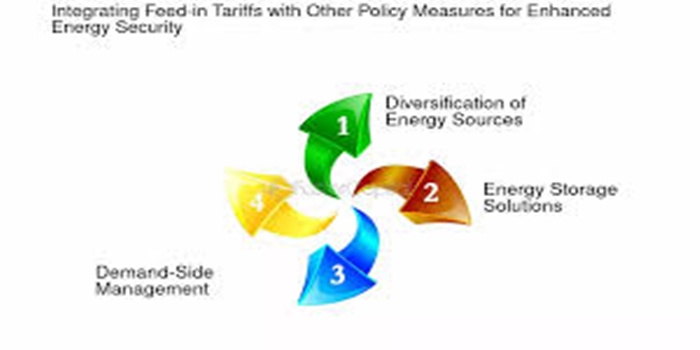In this article, we discussed energy security, the features, the benefits, we also talked about how energy security drives policy.
Definition
Energy security, defined by the reliable availability, accessibility, affordability, and sustainability of energy, significantly drives national and international policy by influencing decisions on energy sources, infrastructure, and economic development to ensure a nation’s stability and well-being. Policy responses aim to balance the need for economic growth with environmental protection, particularly concerning climate change and the transition to cleaner energy sources.
Features of How Energy Security Drives Policy:
Availability and Diversification:
Policies aim to ensure a consistent supply of energy by diversifying energy sources, including domestic resources and imports, and developing infrastructure for their distribution.
Affordability and Accessibility:
Governments prioritize policies that make energy accessible and affordable to all citizens and industries, addressing price volatility and ensuring equitable distribution.
Infrastructure Efficiency and Reliability:
Policies drive investment in robust and efficient energy infrastructure, including generation, transmission, and distribution networks, to prevent disruptions and enhance reliability.
Energy Efficiency and Conservation:
Policies promote energy efficiency measures and conservation practices to reduce demand, lower consumption, and decrease reliance on potentially insecure or expensive sources.
Climate and Environmental Considerations:
The growing imperative of climate change influences energy policy, leading to a focus on transitioning to low-carbon energy sources, promoting renewables, and addressing the environmental impacts of energy production.
Geopolitical and Social Stability:
Energy security policies also consider geopolitical risks and social dimensions, striving to reduce vulnerabilities to international energy market fluctuations and prevent energy-related conflicts and social unrest.
Institutional and Regulatory Frameworks:
Policies often lead to the establishment of specific institutional frameworks and regulatory bodies to oversee energy security, monitor supply, and enforce policies related to energy production and consumption.
Research and Development:
Policies support research and innovation in new energy technologies and solutions to improve energy efficiency, enhance security, and accelerate the transition to sustainable energy systems.
Benefits of Energy Security Driven by Policy:
Economic Growth and Stability:
Energy security fuels economic growth by ensuring a reliable supply for industries, transportation, and essential services. It also contributes to economic stability by reducing dependence on volatile global energy markets and potentially lowering production costs, according to a study. Stable economic and energy policies are crucial for investing in different energy systems and advancing sustainable energy.
National Security:
A secure energy supply is vital for national security, powering defense systems, critical infrastructure, and ensuring social stability through consistent access to heating, cooling, and electricity for communities.
Environmental Protection:
Energy security policies can drive the adoption of cleaner energy sources, reducing pollution and mitigating the long-term effects of climate change. Investing in renewable energy, a key aspect of energy security, also creates jobs and can reduce gender inequality.
International Competitiveness:
By optimizing resource use and potentially lowering energy costs, energy security can enhance the international competitiveness of industries and reduce reliance on expensive energy imports.
Promoting Sustainable Development:
Energy security is intrinsically linked to sustainable economic development, requiring careful coordination of economic and energy policies to balance growth with environmental protection. This often involves diversifying the energy mix and investing in renewable technologies.
How Energy Security Drives Policy:
Diversification of Energy Sources:
To reduce reliance on single or volatile energy markets, policies are developed to promote a mix of energy sources, including renewables and domestic resources.
Investment in Infrastructure:
Energy security necessitates investment in robust and resilient energy infrastructure, including production facilities, transmission lines, and storage, to ensure uninterrupted supply.
Economic Policy Coordination:
Governments coordinate economic and energy policies to foster a stable environment for energy investment and to mitigate economic policy uncertainty, which can hinder the clean energy transition.
Addressing Climate Change:
The growing threat of climate change is a major driver, leading to policies that aim to reduce greenhouse gas emissions while maintaining energy security, often through promoting energy efficiency and clean energy technologies.
Sustainability and Affordability:
Modern energy security frameworks increasingly integrate sustainability and affordability, as seen in the UN’s Sustainable Development Goals, influencing policies to ensure access to reliable and clean energy at affordable prices for all.
Mitigating Supply Interruptions:
Policies are designed to anticipate and respond to potential supply disruptions, whether due to geopolitical factors, natural disasters, or infrastructure failures.
Research and Development:
Governments support research and development in new energy technologies and efficiency measures to enhance energy security and reduce reliance on traditional, potentially less secure, energy sources.
International Cooperation:
Energy security often necessitates international collaboration on energy management, trade, and security protocols, particularly for regions or countries with limited domestic resources.
Conclusion
Energy security is a dynamic and fundamental driver of policy, continually adapting to geopolitical shifts, technological advancements, and environmental imperatives. Governments proactively formulate and implement policies across economic, environmental, and diplomatic spheres to ensure an uninterrupted, affordable, and sustainable energy supply, recognizing that a secure energy future is indispensable for national prosperity and stability.

